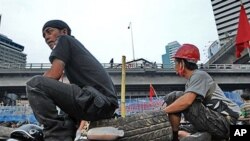Anti-government protesters in Thailand are threatening to move their rallies closer to pro-government groups. But the Thai government, under siege after almost seven weeks of protests, says it is open to new talks if there is no fresh violence.
Tensions rose Tuesday when anti-government protesters laid tires on commuter rail tracks, forcing the closure of Bangkok's skytrain system for hours.
The protesters, known as red shirts, also say they will move close to where pro-government groups are holding rallies, to deter a violent army crackdown.
Sean Boonpracong, a red shirt spokesman, accuses the army of using a double standard, because it tolerates pro-government rallies, but threatens to shut down the red shirt demonstrations.
"They could assemble but the army never really makes any movement to disperse them. They are freely able to assemble and the army did nothing to them," he said. "Now we will go close to them if the army want to disperse us, they are going to have to disperse them at the same time. That's a notice to the army commander … that apply your principle equally."
The demonstrators, led by the United Democratic Front against Dictatorship, want Prime Minister Abhisit Vejjajiva to resign and call elections immediately, a demand the government rejects.
However, Buranuj Sumatharak, a spokesman for the governing Democrat Party, says the government is offering new talks, as long as there is no further violence.
"The key is to ensure that the public is safe … and we're confident that we can restore law and order in the country," said Buranuj. "The government is also open to negotiations so long as it is not done amid the use of violence by the groups affiliated with the demonstrators."
The offer of talks follows a speech by King Bhumipol Adulyadej on Monday to new judges. He called on the judges to work honestly to ensure the country remained orderly. He made no direct reference to the political crisis.
The government overnight charged the UDD of a conspiracy to undermine the monarchy. But the UDD denies the accusation.
The protests are the most severe in almost 20 years. At least 26 people have died and up to 1,000 have been injured in clashes between the military and protesters, and in grenade attacks.
A university survey shows the protests have cost the economy up to $3 billion. Tens of thousands of people have been unable to work because shops, hotels and offices near the red shirt camp in Bangkok have been forced to close.
The red shirts largely support former Prime Minister Thaksin Shinawatra, who was ousted in a 2006 coup.
The UDD says Mr. Abhisit's government lacks legitimacy because it came to power in a parliamentary deal after court rulings removed elected pro-Thaksin administrations.




